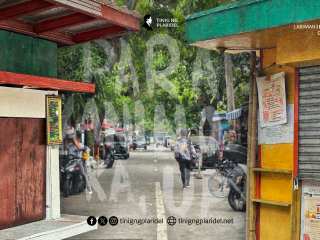The lives of UP students are penetrated by Duterte’s economic policies in almost every aspect, from their daily commute to the food they eat.
As if simply getting by did not pose enough difficulties as it is, UP students are now faced with the grim reality of harsher financial conditions that came with the implementation of the Tax Reform for Acceleration and Inclusion (TRAIN) law.
These are greatly manifested in what products they can no longer afford. And while students may opt not to buy the average Kopiko 78 to cope, most Filipinos have more immediate needs they cannot ignore.
For some, it is their livelihood at stake.
In Area 2 where students go for affordable food choices, most establishments also have to grapple with the effects of the current economic situation in ways they know how.
Adjustments in your area
Bambie, 32, owner of 7-year-old Ralzarap or Ralz, admitted they had to adjust their serving size due to increases in prices of food, especially meat.
“We used to be generous when it comes to our serving portions, but we had to reduce them because we couldn’t just increase our prices,” Bambie said.
From the moment it was conceived, the TRAIN law, one of the key legislations pushed by the Duterte administration, had been heavily criticized for allowing the price increase of basic commodities such as fuel and sugar-based products. It is also said to have caused the surge in the prices of other basic commodities.
This movement of prices and services is referred to as inflation, a term that has become almost as pervasive as the phrase ‘extrajudicial killings (EJKs)’ was during Duterte’s first years in office.
A recent report by the Bangko Sentral ng Pilipinas (BSP) revealed an average inflation rate of 6.2% in the third quarter of 2018, higher than the government’s forecast of 4.8% to 5.2% inflation for 2018, which has already been adjusted from the original 2% to 4% forecast.
Prices of food items such as fish, meat, rice, and vegetables are said to have significantly contributed to the inflation spike.
“Before, a sachet of juice would only cost us P8, but now it has gone up to P16 to P17. We cannot afford it, so instead of increasing our prices, we just stopped giving it for free,” Dondon, a staff of Balay Salu-salo said.
Under the TRAIN law, sweetened beverages are subjected to higher excise tax, prompting price hikes on popular sugary drinks.
Aside from free drinks, Balay Salu-salo was also forced to cut out some ingredients and condiments such as oyster sauce.
Spam More, which has been operating for four years now, makes sure nothing goes to waste to minimize the effects of higher inflation to their business.
“There has been a drastic increase in the prices of the ingredients in our main dishes, such as chicken and spam. The price of spam, for example, has risen to P175 from P130,” said Mae Anne, 23, one of Spam More’s staff.
Lola’s Eatery, on the other hand, chose to start adjusting the prices of some dishes in their menu, particularly their fish and vegetable meals.
The price of their vegetable dish has increased from P25 to P30.
According to Philippine Statistics Authority data, vegetables had the highest price increases among other food items, with the average price of vegetables being 19.2% higher in August than last year.
Lower sales, less staff
In order not to drive away consumers, many eateries in Area 2 opted to keep price increases minimal, if any at all. Yet, this helped little in combatting lower revenues.
Balay Salu-salo’s daily sales, for instance, used to range between P15,000 to P20,000. Now, they only generate a total of around P8,000 to P9,000 daily.
“We didn’t raise our prices because our customers, particularly students, would complain and ask why. But if we don’t increase our prices, what will happen to us? Despite our low wages, we choose to continue with this so we can help the students,” Dondon said.
While these changes in terms of sales have been felt as early as last year, owners and staff said that the impact of inflation hit them the hardest these past few months.
“Our profit started dropping last June or July. I made the decision to increase the price of our dishes just last month,” said Delia, 55, owner of Lola’s Eatery.
Delia attributed this move to the sudden spike in prices of vegetables after heavy rains ravaged vegetable farms in the north.
“I just accepted that our income has decreased. What matters is that we still have customers,” Delia added.
Bambie said that compared to their sales in the past, Ralz is now earning just enough to sustain the business, but nothing more.
“If you are going to deduct our expenses from our income, you’ll see how little will be left,” Bambie said.
Because there is not much extra income to spend, Bambie only buys supplies to replace what has been used in the kitchen, unlike before where she would always buy in bulk.
Bambie also had to reduce the number of helpers in her business from four to two last year, although this was partly because there had been fewer students entering the university since K-12 was implemented.
Balay Salu-salo had also let go four of their staff, some of whom had chosen to leave on their own volition because of low wages. Dondon, who is also tasked to manage the business’ day-to-day operations, had considered leaving himself.
“I was supposed to leave this October, but my cousin, the owner of this establishment, asked me to stay because no one would manage the place.”
Lola’s Eatery had not cut down their staff, but increased their wages instead.
“They need to earn. I have also experienced being a worker, so I understand their situation. When prices are going up, you cannot just cut their pay,” Delia explained.
Unfortunately, the government remains out of touch with its people’s realities and has only gotten more creative in coming up with new methods to end lives. Like a serial killer, it seems to have taken pleasure in watching its citizens die a slow, painful death.
Photo by Quin Astilla
This article is from Tinig ng Plaridel’s November 2018 print issue. Read the rest of the print articles now on Issuu!
INSIDE: Sagay Massacre, CMC Orgs, UP Workers vs Admin, Kababalaghan sa Halalan, Patintero sa Daan, The Slow Death of Area 2, and the latest in UP sports









